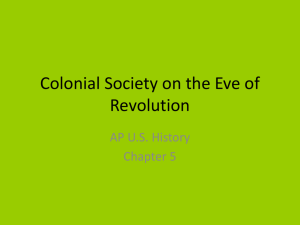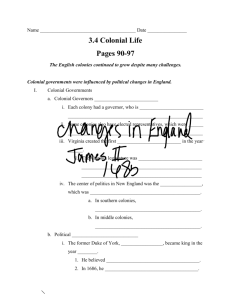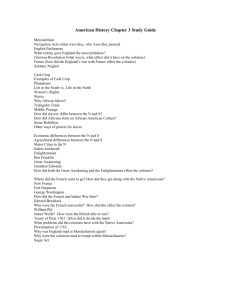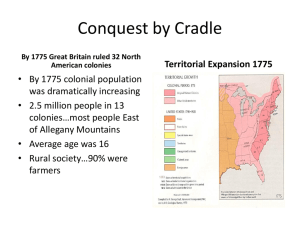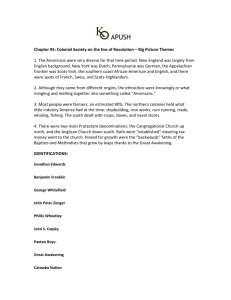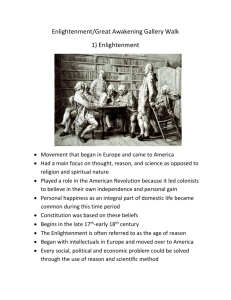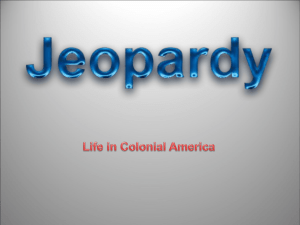Colonial Society Prior to the American Revolution
advertisement
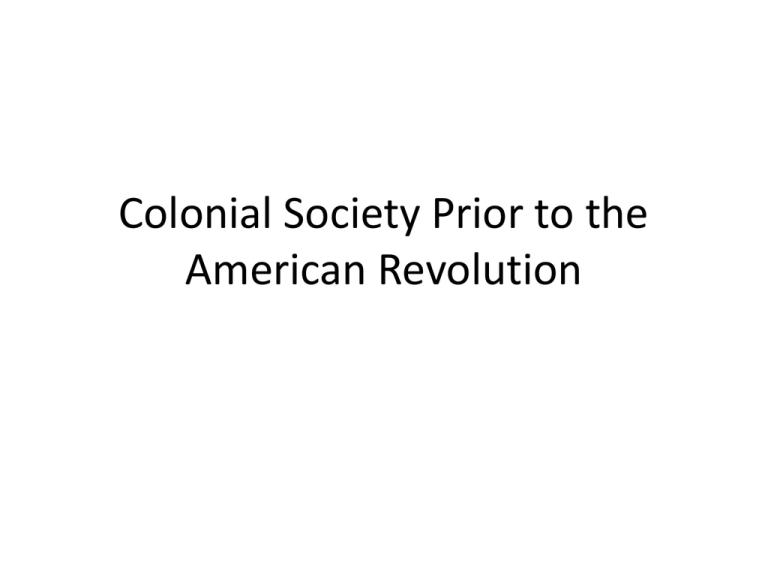
Colonial Society Prior to the American Revolution Colonial Demographics • Colonial America, though mostly English, had other races as well. • Germans accounted for about 6% of the population, or about 150,000 people by 1775. • Most were Protestant (primarily Lutheran) and were called the Pennsylvania Dutch. The Scots-Irish • The Scots-Irish were about 7% of the population, with 175,000 people. • They had been transplanted to Northern Ireland, over the decades, but did not found a home there (the already existing Irish Catholics resented the intruders). • Many of them reached America and became squatters, quarreling with both Indians and white landowners. Hot Headed Scots-Irish • In 1764, the Paxton Boys was a vigilante group that murdered twenty Native Americans (the Conestoga Massacre) • They also felt that the Pennsylvania colonial government was wrong for using tax money to provide subsistence to the peaceful Indians living among them • Continuing their contempt towards perceived abusive governments, many of the Scots-Irish became American revolutionists and later presidents. Andrew Jackson Jimmy Carter Andrew Johnson George H.W. Bush Ulysses S. Grant William Clinton Theodore Roosevelt George W. Bush Harry Truman Barak Obama John Kennedy Richard Nixon • About 5% of the multinational population consisted of other European groups, like French Huguenots, Welsh, Dutch, Swedes, Jews, Irish, Swiss, and Scots Highlanders. Most with little loyalty to the English crown • The Congregational Church had much influence in Northern Colonies • The Anglican Church (Church of England) had more support in the Southern colonies and New York (also more support for the king) Changing Attitudes The Enlightenment • Philosophy that the world is not governed by chance or miracles but fixed mathematical laws. • People began to apply experimentation and reasonable thought to society and started to question their governments Individualism • Political philosophy that the individual is the most important unit of society and that individuals have rights which come from God Not a Monarchy. • John Locke-Two Treatise of Government (1689) “ Life, Liberty, Health or Possessions” • Jean Jacques Rousseau- Social Contract (1762) “Governments exist to protect the rights of the people” Social Mobility • In contrast to contemporary Europe, America was a land of opportunity. • Anyone who was willing to work hard could easily go from rags to riches, and poverty was scorned upon. • Puritan work ethic and self-determination were the keys to success • Colonies has more social mobility than England because classes are not established as deeply • Virginia has landowners, poor farmers, and slaves. • Massachusetts Bay is more equal because of the Puritan Church • The Southern colonial society was becoming more socially segmented than the Northern colonial society Benjamin Franklin • Was a noted author, printer, satirist, political theorist, politician, post master, scientist, inventor, civic activist, statesmen, and diplomat • World renowned scientist discovered lightning as a form of electrical power. • Ben Franklin’s Poor Richard’s Almanac was very influential, containing many common sayings and phrases, and was more widely read in America and Europe than anything except for the Bible. The Junto • Franklin organized a group of friends to debate questions of morals, politics, and natural philosophy, and to exchange knowledge of business affairs • The members of the Junto were drawn from diverse occupations and backgrounds, but they all shared a spirit of inquiry and a desire to improve themselves, their community, and to help others. Freedom of the Press • John Peter Zenger, a New York newspaper printer, was charged with seditious libel. • The judge urged the jury to consider that the mere fact of publishing was a crime, no matter whether the content was derogatory or not. • Zenger won the case in part to the defense provided by Andrew Hamilton • Afterwards, freedom of the press was pretty much assured in America The Great Awakening • Due to less religious fervor than before and worry that so many people would not be saved (too materialistic), the stage was set for a revival: the Great Awakening. • Jonathan Edwards was a preacher with fiery preaching methods, emotional moving many listeners to tears while talking of the eternal damnation that nonbelievers would face after death, if they did not form a personal relationship with God Sinners in the Hands of an Angry God • “That God that holds you over the pit of hell, much as one holds a spider, or some loathsome insect over the fire, abhors (hates) you, and is dreadfully provoked: His wrath towards you burns like fire; He looks upon you as worthy of nothing else but to cast you in the fire;….. And yet it is nothing but His hand that holds you from falling into the fire every moment” Jonathan Edwards • George Whitefield was even more convincing than Edwards • He even made Jonathan Edwards weep and persuaded Ben Franklin to empty his pockets into the collection plate. • Imitators copied his emotional shaking sermons and his heaping of blame on sinners. • These new preachers were met with skepticism by the “old lights,” or the orthodox clergymen. Impact of the Great Awakening • Brought many colonist into churches, including Native Americans and African Americans. • Caused people to question traditional British authority and the Anglican Church • Built many churches in the South that created a social meeting area for discussion • Both the Enlightenment and Great Awakening emphasized the individual. Advantages • Founding of “new light” centers like Princeton, Brown, Rutgers, and Dartmouth. • The Great Awakening led to divisions among Protestant congregations into New and Old Light factions • It increased religious fervor • The movement helped erode respect for religious authority by challenging some of the traditional denominations • It also promoted democratic concepts, including a sense of freedom of conscience. • The Great Awakening was the first religious experience shared by all Americans as a history. Mercantilism • Focuses on exporting of goods (selling goods manufactured in the country) in exchange for gold, silver, or money and limiting number of imports (goods that are sold in the country but made elsewhere.) Exports>imports=profit (gold) • Prosperity of a nation is dependant on its supply of capital • Colonies were expected to supply the mother country with raw materials and a market for Triangular Trade • Three way trading network between Europe, Africa and the Caribbean and North American colonies • A ship would leave New England with rum and go to the Gold Coast of Africa and trade it for African slaves. Then, it would go to the West Indies and exchange the slaves for molasses, which it’d sell to New England once it returned there. The Middle Passage • Portion of the triangular trade route where slaves from Africa were transported to the auction block or sugar plantations of the Caribbean • Slaves were tight packed to increase numbers and profit • Disease killed many during the journey • Others were forced to eat to maintain their weight so they would fetch a higher price at auction Trees Cause Tension • Britain sometimes marked the tallest trees for its navy (for ship masts) • Colonists resented that, even though there were countless other good trees in the area and the marked tree was going toward a common defense • It was the principle Molasses Act • Law passed by Parliament in 1733 • Imposed a six pence per gallon tax on molasses from non-British colonies. It would cripple American international trade by hindering its trade with the French West Indies. • The Act was not passed for the purpose of raising revenue, but rather to regulate trade by making British products cheaper than those from the French West Indies • Colonists got around it through smuggling. American Art and Architecture • John Trumbull of Connecticut was discouraged, as a youth, by his father. Battle of Bunker Hill • Charles Willson Peale, best know for his portraits of George Washington, also ran a museum, stuffed birds, and practiced dentistry in addition to his art. • Benjamin West and John Singleton Copley had to go to England to complete their ambitious careers. Death of General Wolfe by West Portrait of Paul Revere Copely • Architecture was largely imported from the Old World and modified to meet American needs. • The log cabin was borrowed form Sweden. • The red-bricked Georgian style was introduced in about 1720. Seeds of Self-Government • Practically every colony utilized a two-house legislative body. • The upper house was appointed by royal officials or proprietors. • The lower house was elected by the people. • Self-taxation with representation came to be a cherished privilege that Americans came to cherish above most other rights. The Fabric of America • America in 1775 was like a quilt, each part different and individual in its own way, but all coming together to form one single, unified piece. Colonial Society Quiz 1. Which group of European immigrants was known for their quick tempers and taking justice into their own hands against the Native Americans in Pennsylvania? 2. Which colonial region had stronger religious ties to the Anglican church resulting in stronger support for the king of England as well? 3. What is the name for the intellectual movement (that started in Europe and spread to America) that focused on logical thought and experimentation to explain the social and political workings of the world? 4. According to individualism, who gives people natural rights such as life, liberty, and property? 5. How could a person achieve social mobility in colonial America? 6. What freedom of expression did the Zenger trial safeguard? 7. Which Great Awakening minister used fiery imagery to convince colonists to form a personal relationship with God in his sermon, Sinners in the Hands of an Angry God? 8. According to the economic system of mercantilism, what were the colonies supposed to provide to the mother country? 9. What is the name for the portion of the triangular trade route that transported slaves from Africa to the Americas? 10. The Molasses Act made it expensive for the American colonies to import sugar from which foreign colonies? 11. Which natural resource was a source of tension between the English colonists and the English government? Not because the item was in short supply, it was the principle of Britain demanding the resource from the colonies
